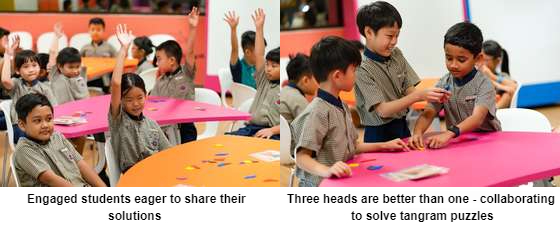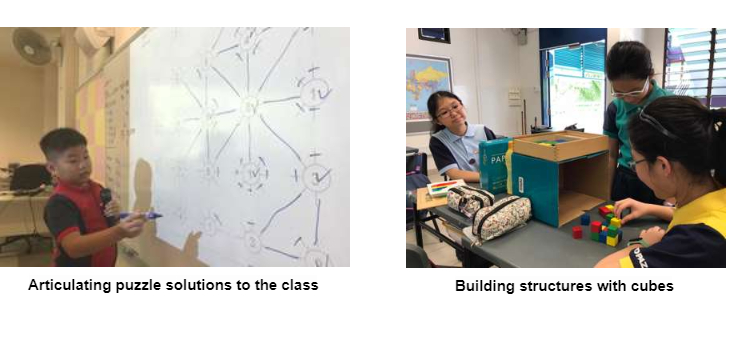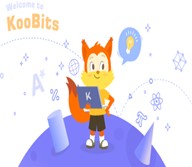Key Programmes
Our Math programmes and learning experiences are uniquely planned and designed so as to develop in our students a deep understanding of mathematical concepts. These learning experiences include hands-on activities and the use of technological aids to help them relate abstract mathematical concepts with concrete experiences.
Model-Eliciting Activities in Mathematics
Model-Eliciting
Activities (MEAs) are designed to develop mathematical understanding and
competencies through the application of knowledge and skills to solve authentic
real-world problems. Students intepret and make reasonable assumptions
and simplifications mathematically before evaluating real-world problems.
The following two key principles guide the design of the MEA in Mathematics;
(i) Reality Principle: Problem posed is open-ended, meaningful and relevant to the students and based on real or slightly modified real data.
(ii) Model Construction Principle: Problem allows for the creation of a model involving two or more variables, establishing relationships between the variables and deriving the patterns governing these relationships.
MEA in Primary 3
Primary 3 students investigate
the relationship between the length of a person's foot to his/her height.
The collective data of each group of students are plotted in Excel and
a best-fit line is used to predict the height of 'Bigfoot'. Through this
experience, students appreciate the value of Mathematics in everyday life
and gain motivation in applying Mathematics.

MEA in Primary 5
Primary 5 students construct a popcorn box as one of the activities in
'I am a Young Mathematician' card. They use the idea of optimisation, apply
visualisation skill, spatial reasoning and geometric modelling skill to
solve this mathematical optimisation problem.
PERI Holistic (HA) Assessment
Holistic assessment
refers to the process of using multiple sources to continually gather information
on a child’s development, to provide feedback to support and guide learning. Holistic
Assessment aims to support student learning and development, to build
their confidence and desire to learn, and to better prepare them for the
future.
The assessments can take various forms such as bite-sized assessment, performance assessments, journals and problem solving tasks. These assessments will be carried out throughout the year.
Learning Support Programme
LSM (Learning Support
for Mathematics) is an early intervention programme aims at providing learning
support to students who do not have foundational numeracy skills and knowledge
to access the Primary 1 Mathematics curriculum. A screening process is
carried at the beginning of Primary 1 to identify the students who need
intervention.
In Anderson Primary School, P1 to P3 students who are in the programme will attend Mathematics lessons conducted by our LSM Teachers in small groups during curriculum hours so that greater attention can be devoted to each student.

Spatial Visualisation Skills Programme (P1)
The Spatial
Visualisation Skills Programme aims to enhance our lower primary students’
visual and spatial awareness. The use of Tangram Puzzle not only keeps
our young minds engaged but also deepens their interest and understanding
in topics which require visual-spatial skills as they move up the levels.

Excellence 2000 (E2K) Programme (P5 & 6)
The
E2K Mathematics Programme aims to develop in students mathematical reasoning
skills and deepen their conceptual understanding through an inquiry approach.
Students will have opportunities to collaborate with their peers and engage in mathematical thinking through resources such as puzzles, games and mathematics explorations which are specially designed for the programme. The rich learning experiences offered by the programme serve to help students to develop the habits, attitudes and dispositions mathematicians possess, as well as to gain important 21st century competencies such as critical and inventive thinking and effective communication skills.

ICT-infused lessons, Model-Eliciting Activities (MEA), Topical & Heuristics Worksheets
ICT infused lessons are designed to provide opportunities for students
to work collaboratively, deepen their understanding of mathematical concepts
and be self-directed Mathematics Learner.
Topical worksheets are developed for all levels as formative assessments and reinforcement of concepts learnt in Mathematics lessons. A structured set of heuristics worksheets is designed to develop and strengthen students’ problem-solving skills.
Competitions
P5 and P6 students who have shown aptitude in Mathematics will be selected
to take part in the following Mathematics competitions:
-
Asia Pacific Mathematical Olympiad for Primary Schools (APMOPS)
-
Raffles Mathematical Olympiad (RMO)
-
NUS High School National Mathematical Olympiad of Singapore (NMOS)
KooBits Problem Sums online portal (P1 to 6)
Anderson
Primary School adopts KooBits, an online learning portal for Problem Solving
to engage students in Math learning.



